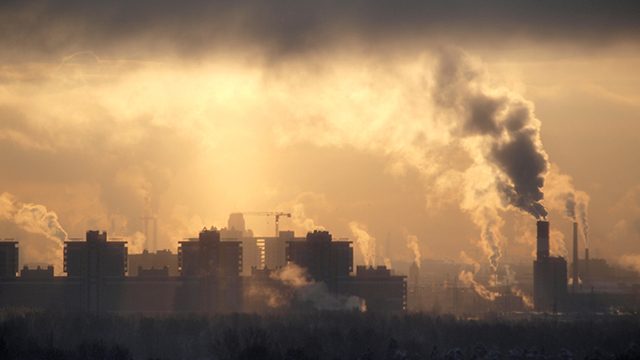SUMMARY
This is AI generated summarization, which may have errors. For context, always refer to the full article.

ALBAY, Philippines – A new report tracked the global economic cost of the health impact of air pollution from fossil fuels, which totaled around $2.9 trillion or approximately 3.3% of global GDP in 2018 due to work absences, years of life lost, and premature deaths.
That represents an $8 billion cost daily.
The report entitled “Toxic Air: The Price of Fossil Fuels” is the first of its kind and was published by Greenpeace Southeast Asia, together with the Centre for Research on Energy and Clean Air (CREA).
In the Philippines, air pollution from fossil fuels – primarily coal, oil, and gas – was attributed to causing an estimated 27,000 premature deaths per year, and could cost the country up to approximately 1.9% of GDP in economic losses annually, according to the research.
Key findings from the report showed that an estimated 40,000 children died before their fifth birthday because of exposure to PM2.5 pollution from fossil fuels, primarily in low-income countries.
Nitrogen Dioxide (NO2) – a byproduct of fossil fuel combustion in vehicles, power plants, and factories – was linked to roughly 4 million new cases of asthma in children each year, with approximately 16 million children worldwide living with asthma due to exposure to NO2 pollution from fossil fuels.
In terms of productivity, air pollution from fossil fuels was attributed to causing around 1.8 billion days of work absence due to illness each year worldwide, equating to annual economic losses of approximately $101 billion.
The report emphasized that health impacts from air pollution change significantly depending on the geographical location. Factors include types of pollutants, pollution sources, and environmental conditions combined with differences in population and lifestyle.
Air pollution in PH
In the Philippines, coal-fired plants contributed a lion’s share to air pollution in host provinces, while vehicular emissions were the main culprit in the country’s urban centers.
Data from the Department of Environment and Natural Resources (DENR) showed that vehicular sources account for 65% of air pollution in the country, primarily in Metro Manila.
According to Greenpeace Philippines liveable cities campaigner Rhea Jane Mallari, air pollution is expected to increase given the projected 4.6% annual growth rate in energy demand.
This is consistent with the projected increase of road vehicles to 24.8 million by 2030, compared to a baseline of 6.6 million in 2010, according to a 2017 report by the Asian Development Bank.
Mallari said “vehicles are a major source of air pollution – but this data also tells us that improving mobility in cities is a key solution to the problem.”
And speaking of solutions, the study said that these are already available, are increasingly widespread and affordable, and can improve the health and well-being of people.
According to the study, car-free initiatives have demonstrated that radical changes to transport systems have the potential to boost physical activity, reduce emissions of harmful air pollutants and greenhouse gases, and improve health.
On mobility
But the bigger shift is happening globally to move the transport system away from fossil fuels and approach mobility in a way that is sustainable and equitable for all.
“More than 15 countries have announced plans to phase out new petrol and diesel cars, and, in some cases, hybrids,” sending a strong signal to markets that there is no future for fossil fuel vehicles, the report said. An example is Shenzhen for its world’s first fully electric feet.
This shows that cities and municipalities need fewer and cleaner vehicles operating alongside greater use of public transport and widespread investments in shared mobility, walking, and cycling.
Moreover, the report said that “policy to reduce air pollution does not need to be expensive, and, where interventions are costly to implement, the benefits can outweigh the costs.”
For example, data from the United States Environmental Protection Agency showed that the United States Clean Air Act has returned substantially greater economic benefits in relation to the costs of implementation, where for every $1 invested, the US economy saw benefits of at least $30 returned.
The study also cited well-documented case studies on the benefits of phasing out coal plants:
- Less exposure to polyaromatic hydrocarbons (pollutants) from a power plant can enhance neurodevelopment, as shown in one study in China that evaluated the impact of coal-fired power plants on childhood development.
- In Dublin, Ireland, a 1990 ban on bituminous coal sales reduced wintertime black smoke by 70% and decreased deaths from respiratory illness by 15% (about 116 people per year).
In Greenpeace’s 2019 report on the energy outlook in the country, it recommended that the current administration must stop energy companies from building new coal plants; should retire existing coal plants; and invest in clean energy generation, such as wind and solar.
“The energy and transport sectors need to be transformed so they can be part of the solution. We all deserve cleaner air,” Greenpeace Philippines energy transition campaigner Khevin Yu said. – Rappler.com
Add a comment
How does this make you feel?
There are no comments yet. Add your comment to start the conversation.